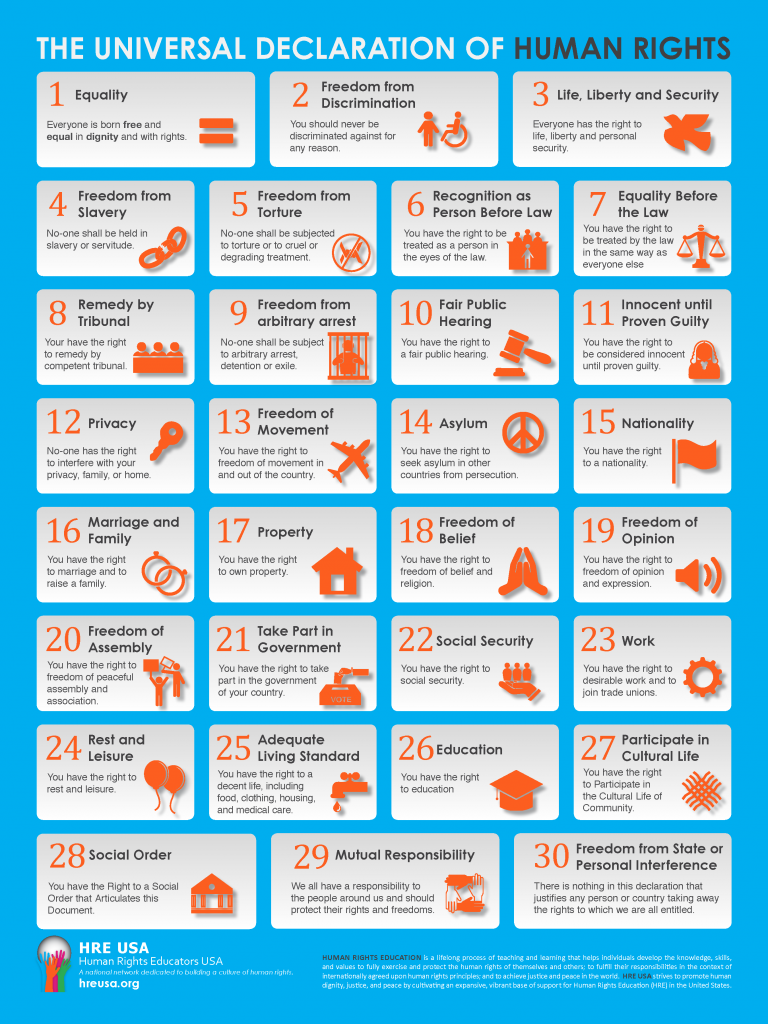Ahmedabad
(Head Office)Address : 506, 3rd EYE THREE (III), Opp. Induben Khakhrawala, Girish Cold Drink Cross Road, CG Road, Navrangpura, Ahmedabad, 380009.
Mobile : 8469231587 / 9586028957
Telephone : 079-40098991
E-mail: dics.upsc@gmail.com

75 years of Universal Declaration of Human Rights
News: Seventy-five years ago on 10th December 1948, the UN General Assembly approved the Universal Declaration of Human Rights at a meeting in Paris – laying one of the foundation stones of the international order that emerged following the horrors of World War II.
What is the Universal Declaration of Human Rights?
• The Universal Declaration of Human Rights (UDHR) is a milestone document in the history of human rights. It was drafted by representatives with different legal and cultural backgrounds from all regions of the world.
• The Declaration was proclaimed by the United Nations General Assembly in Paris on 10 December 1948 as a common standard of achievements for all peoples and all nations.
• The UDHR consists of 30 articles detailing an individual’s “basic rights and fundamental freedoms”. It is universally applicable for all human beings of varying race, religions, and nationality.
• Even though the Universal Human Rights Declaration is not legally binding, its contents have been elaborated and incorporated into subsequent international treaties, regional human rights instruments, and in the legal codes of various countries.
What is the significance of UDHR?
• Foundation of Human Rights: The UDHR is recognized as the foundation of freedom, peace, justice, and equality. It marked the equality of humans without any discrimination based on religion, creed, color, sex, or any other characteristics.
• Impact on Constitutions: The UDHR had a significant impact on various national constitutions. For instance, in India, Part III (which deals with Fundamental Rights) and Part IV (which deals with Directive Principles of State Policy) of the Indian Constitution are quite similar to the UDHR.
• The Universal Declaration of Human Rights inspired the anti-apartheid movement, LGBTIQ+ movement, anti-racism movements. For example, Civil Right movement in the USA.
• The most commonly used phrase “rule of law” was first used in the document of UDHR. As per the principle, human beings are equal in the eyes of the law irrespective of territorial, jurisdiction and political ideologies.
• Universality of Human Rights: One of the major accomplishments of the UDHR was the establishment of the universality of human rights. It asserts that human rights apply to all humans, regardless of their gender, race, religion, nationality, or culture.
• UDHR gave strength to decolonization movement (In Africa and South-east Asia) by highlighting basic tenets of human dignity and freedom.
What are the Challenges to the Universal Declaration of Human Rights?
• Conflict and Violence: The surge of conflict in the Middle East and other regions (Russia-Ukraine, Central Africa, Israel-Palestine) has led to a cycle of violence and retribution, causing intolerable human pain. This has posed a significant challenge to the principles of the UDHR.
• Discrimination and Racism: There has been a rise in racism and discrimination, notably against women and girls. This goes against the UDHR’s principles of equality and non-discrimination.
• Inequalities: Deepening inequalities have been observed, with the 2030 Agenda promise to end extreme poverty faltering due to spiraling food and fuel prices.
• Targeting of Civilians: There have been growing trends towards the targeting of civilians by governments and armed groups with impunity.
• Violence Against Women: Pervasive violence against women continues to be a major issue.
• Corruption in Governance- Corruption threatens the rule of law, democracy and human rights and undermines good governance.
• Promotion of Torture: The promotion of torture and ill-treatment as acceptable modes of intelligence gathering has been observed
• As the UDHR is a non-binding document, it’s impact is little in checking compliance of human rights violations.
Way Forward
• Enforce Domestic human rights law that protect the most vulnerable in the society
• The legislations and provisions of the day should be aligned according to the UDHR. Public flogging in the Middle East needs to be stopped as an example.
• The UNSC must play a proactive role, come over its partisan interests and act neutrally to protect the principles enshrined in UDHR.

Address : 506, 3rd EYE THREE (III), Opp. Induben Khakhrawala, Girish Cold Drink Cross Road, CG Road, Navrangpura, Ahmedabad, 380009.
Mobile : 8469231587 / 9586028957
Telephone : 079-40098991
E-mail: dics.upsc@gmail.com
Address: A-306, The Landmark, Urjanagar-1, Opp. Spicy Street, Kudasan – Por Road, Kudasan, Gandhinagar – 382421
Mobile : 9723832444 / 9723932444
E-mail: dics.gnagar@gmail.com
Address: 2nd Floor, 9 Shivali Society, L&T Circle, opp. Ratri Bazar, Karelibaugh, Vadodara, 390018
Mobile : 9725692037 / 9725692054
E-mail: dics.vadodara@gmail.com
Address: 403, Raj Victoria, Opp. Pal Walkway, Near Galaxy Circle, Pal, Surat-394510
Mobile : 8401031583 / 8401031587
E-mail: dics.surat@gmail.com
Address: 303,305 K 158 Complex Above Magson, Sindhubhavan Road Ahmedabad-380059
Mobile : 9974751177 / 8469231587
E-mail: dicssbr@gmail.com
Address: 57/17, 2nd Floor, Old Rajinder Nagar Market, Bada Bazaar Marg, Delhi-60
Mobile : 9104830862 / 9104830865
E-mail: dics.newdelhi@gmail.com